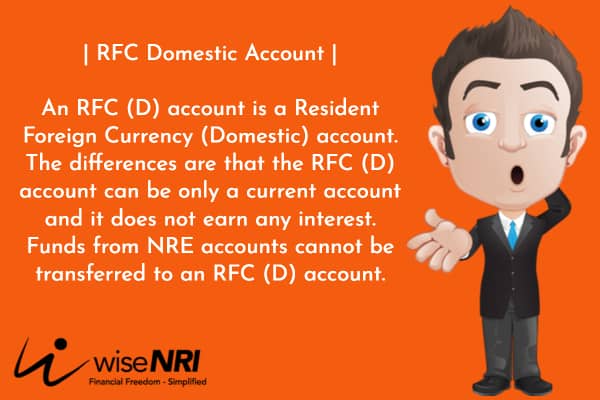Resident Foreign Currency accounts – they are bank accounts that can be maintained by resident Indians in foreign currency.
RFC accounts are helpful for NRIs as NRIs might have money in foreign currency in bank accounts abroad that they would like to bring to India.

Check – NRE FD after Return to India
What is RFC Account?
RFC accounts are bank accounts that can be maintained by resident Indians in foreign currency. These accounts are especially useful for NRI who returns to India and would like to bring back foreign currency from their overseas bank accounts.
What are the features of a Resident Foreign Currency Account?
- An RFC Saving account in India can be opened when an individual returns to India after residing abroad for a year or more.
- Resident Foreign Currency accounts can be opened in any of the banks in India such as ICICI Bank, Yes Bank, Axis Bank, SBI, etc.
- An RFC Bank account can be a current account, a Resident Foreign Currency savings account, or a fixed deposit account.
- The amount deposited in the account should be in any freely convertible foreign currency i.e. foreign currencies that can be exchanged easily with other currencies such as US Dollar, GB Pound, Japanese Yen, Euro, etc. The foreign currency accepted depends on the banks. For example, ICICI bank allows opening accounts in GB Pound and US Dollars. SBI allows the opening of RFC saving accounts in USD, Euro, and GB Pound.
- The account can be opened under a single name or jointly with eligible returning NRI or a resident relative. A resident relative includes the following – spouse, mother, father, step-parents, son, daughter, stepchildren, daughter-in-law, son-in-law, brother, sister, step-brother, and step-sister. But resident relatives cannot operate the account.
- Amount deposited can include –
- Foreign exchange earnings via profession, business, or employment abroad and money present in overseas bank accounts
- Pension received abroad.
- Interest and Dividend earned abroad
- Gifts received in monetary form or
- Funds from the sale of assets.
- Money can be transferred from an NRE account to an RFC account too.
- Funds from the RFC Saving account can be transferred abroad for bonafide purposes. It can also be transferred to NRE/FCNR accounts in case the individual becomes an NRI again. Cash can be withdrawn in India as well. You will get the amount after conversion to Indian Rupees based on the prevailing exchange rate.
- A nomination facility is also available.
“Funds from the RFC account can be transferred abroad for bonafide purposes. It can also be transferred to NRE/FCNR accounts in case the individual becomes an NRI again.” wiseNRI
Must read – NRE Accounts Vs NRO Accounts – Everything You Must Know
RFC Saving Account Interest Rate
Interest is credited quarterly. Interest rates are decided by the banks based on tenure and currency.
Foreign currency nonresident account (Savings) interest is negligible – around .01%

RFC Fixed Deposit Rates
| Period | GBP | USD | EURO | JPY |
| < 29 Days | 0.01% | 0.01% | 0.01% | 0.01% |
| 30 days – 3 Months | 0.01% | 0.01% | 0.01% | 0.01% |
| 3 Months 1 day – 6 Months | 0.01% | 0.01% | 0.01% | 0.01% |
| 6 Months 1 day – < 1 Year | 0.01% | 0.01% | 0.01% | 0.01% |
| 1 year – < 2 years | 0.01% | 0.01% | 0.01% | 0.01% |
| 2 years – < 3 years | 0.01% | 0.01% | 0.01% | 0.01% |
| 3 years only | 0.01% | 0.01% | 0.01% | 0.01% |
Source: HDFC Bank
Read – What is RNOR?
RFC Domestic Account
There is some difference between the RFC Saving account and the RFC (D) accounts.
An RFC (D) account is a Resident Foreign Currency (Domestic) account. The differences are that the RFC (D) account can only be a current account and it does not earn any interest. Funds from NRE accounts cannot be transferred to an RFC account(D).
The account can be opened by completing the application form along with a self-attested passport copy, copy of work visa or work permit that the NRI had while being abroad, and Indian address proof.
RFC account is useful for a returning NRI. The amount can be used in India as well as used for remitting money abroad in case there are any transactions to be done. If the amount is to be received and the foreign bank accounts are closed, money can be remitted to this account. It helps to complete unfinished financial matters smoothly.
This post is written by Vidya – she is an NRI.
If you have any questions regarding the Resident Foreign Currency account or you would like to share your experience – use the comment section.
FAQs
Q1. What is a resident foreign currency account?
Ans. Resident Foreign Currency accounts – They’re bank accounts that can be maintained by resident Indians in foreign currency. These accounts are helpful for NRIs as they might want to bring money from abroad to India.
Q2.What are the benefits of opening an RFC account?
Ans. RFC Account helps you with the saving of foreign currency and provides tax exemption on the interest that accrues when you declare the status of a Resident-Not-Ordinarily-Resident. You can also repatriate funds via RFC Account for a bonafide purpose
Q3. What is an RFC Fixed Deposit?
Ans. RFC Fixed Deposit is a great opportunity for the Non-resident Indian who had returned to India to earn high returns on the funds which he holds in foreign currency. It is a type of deposit that can be held for a maximum of 3 years.

I’m a resident of India and earn in USD through a remote job, Can I open the account?
Hi Farheen,
As an Indian resident You cannot open an NRI/NRO account but you can open a Resident Foreign Currency account or hold a regular savings account and convert your USD earnings through authorized channels.
Rfc account can l open l live in uk
Hi Karan,
Yes, living in the UK, you can open and maintain an RFC account in India.
I am looking for resident foreign currency account openings….process
I am holding a RFC account term deposit which is matured after 3 years period. Can I renew the same in same currency. Now I am a resident
Hey Karan,
Yes, as a resident, you can renew your RFC (Resident Foreign Currency) account term deposit in the same currency after it has matured. RFC accounts are designed for residents who have returned to India after being an NRI. When your RFC term deposit matures, you can choose to renew it for the same or a different duration, and you can also maintain it in the same currency as before.
what is the difference between RFC and RFC (D) account with example
Hi Ravish,
The differences are that the RFC (D) account can only be a current account and it does not earn any interest.
what is the difference between resident foreign currency (domestic) account and resident foreign currency account?
Hi Harshi,
The differences are that The Resident Foreign Currency (Domestic) account can only be a current account and it does not earn any interest.
How long one can maintain RFC deposit in Bank after NRI becomes resident
Hi Mady,
As per my knowledge you can maintain it for 2-3years.
After returning to India, let us say in Dec 2022, when do we cease to be an NRI?
Hi Jaya varghese
It is usually 2 years and rest it depend upon your earlier visits.
Can an NRI son gift his father in foreign currency outside India to purchase a house property outside India? What are the FEMA implications?
Hi Bishwajit,
Yes he can.for FEMA implications he should consult with a CA.
How can I transfer money from a account in India owned by a resident of India to a NRI living in the UK with minimum tax? I have looked at gifts, NRE,NRO, RFC, please help… The NRI has a NRE and NRO account. The sum being transferred is 50,000 pounds equivalent.
Hi Kani
If the NRI is your relative then you can transfer it with a gift deed. If not a relative then you have to pay taxes
NRE deposit held in INR can it be transferred to RFC account?
Hi Suneet,
As per my knowledge, the NRE account can be converted into an RFC account.
As a resident savings account customer ,can i open a foreign currency account or RFC account? i was never an NRI.
Hi Ram,
As per my knowledge, You can’t open the respective account.
I wanna be how what I do to receive an account to use in RFC SAP ECC?
Hi Pedro,
You should consult with your bank regarding this.
I have NRE savings account jointly held with my wife. My status has been changed from NRI to resident Indian but my wife is still an NRI. I am primary holder of the account. Can i change this account to RFC account and how.
Hi Ashish,
Yes you have to change this account to RFC.you should consult with your bank for this.
I returned India on 4th October after 33yrs staying in Saudi Arabia ..I need investment and tax consultation with you pls advise how will I proceed
Sure Dr Masood – we will get in touch with you.
Thanks for your nice article..How long a returning NRI can maintain the RFC accounts? Is it life long or for some limited years?
Very good and pertinent question. Could some person please answer this question.
Hi Amit,
NRI Can maintain the RFC account maximum 3 years.
Thanks Sanjoy…But I am not sure about your reply..As far as I know, during RNOR status of maximum 3 yrs, RFC account interest is tax free and afterwards it is treated as a Domestic RFC account , thus interest becomes taxable in India and can be maintained for a indefinite time…Please check and confirm/revert…
Waiting for your feedback…A. Dutta
Useful reading. Being NRI, I become enriched with this article.
Thanks Shyamal 🙂
A NRI for 25 years returning to India having USD FCNRs and NRE Rs deposits.
1. What should be done with NRE InRs deposits ? Can they be retained till maturity? Is the interest taxable or taxfree?
2. What should be done with USD FCNRs? Can they be retained till maturity? Is interest taxfree?
3 For InRs NRE account – is it to be converted to RFC account?
Thanks NM
Hi. NM
1. Yes, you can retain those till maturity and interest will be tax -free.
2. Yes, you can also hold USD FCNR till maturity and interest will be tax-free.
3. Yes
Please refer for more info. https://www.wisenri.com/nre-fd-after-return-to-india